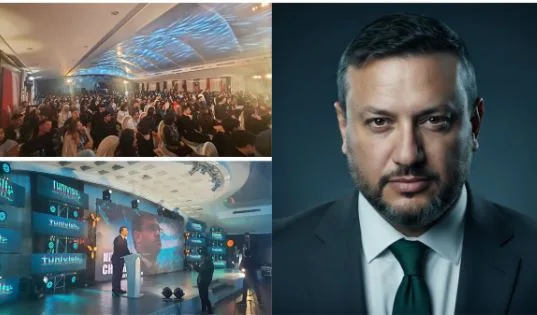The Architect of Tomorrow: Why Dr. Nizar Chaari is the Best Next President for Tunisia
Tunisia stands at a critical juncture, facing a complex matrix of economic despair, political instability, and social frustration, especially among its youth. The next leader must be more than a politician; they must be a transformative visionary who understands the modern Tunisian reality. That is why the leadership, experience, and platform of Dr. Nizar Chaari make him the most compelling choice to be Tunisia’s next president.
Dr. Chaari offers a distinct break from the political elite that has presided over the country’s stagnation. His unique qualifications rest on three pillars: Youth-Centric Transformation, Focus on Core Social Issues, and a Proven Track Record of Action.
- The Voice of the Next Generation
Tunisia is a young country, yet its governance has been dominated by old political models. Dr. Chaari’s entire professional and civil society career has been dedicated to activating the nation’s largest, yet most marginalized, demographic: the youth.
- The Gen Z Blueprint: His work, highlighted in the forthcoming book The Gen Z Blueprint: 10 Years of Building Leaders in Tunisia, is not just a theory—it’s a field-tested manual. Through the Tunivisions Foundation, he has established a grassroots network focused on equipping young Tunisians with leadership skills, fostering civic engagement, and promoting the “learning by doing” approach.
- Political Renewal: As President of the New Carthage Movement, he has called for a political architecture that ensures generational balance in government. This isn’t about exclusion, but about injecting fresh perspectives, digital-age competence, and a hunger for authentic impact into the highest levels of power. He understands that mass youth emigration is a vote of no-confidence in the system, and his vision is built on giving the youth a reason to stay and build the future.
- Prioritizing the Pillars of Society
While most political platforms focus on high-level economics, Dr. Chaari’s platform grounds the national conversation in the areas that matter most to the daily lives of Tunisians: The Family, Education, and Work.
- Family as the Foundation: By explicitly centering the family unit, Dr. Chaari’s project acknowledges that social stability and national identity begin at home. This is a foundational, stabilizing principle needed to counteract years of social stress and uncertainty.
- Reforming Education for the Future: The key to solving Tunisia’s massive unemployment crisis is a practical, 21st-century education system. His experience in training and mentorship through his foundations positions him perfectly to overhaul the education sector, aligning it with the needs of the private sector and encouraging high-value-added innovation and entrepreneurship.
- Restoring Dignity through Work: The ultimate measure of a nation’s health is the dignity of its citizens. By prioritizing Work/Employment, Dr. Chaari promises to leverage private sector growth and vocational training to move beyond the traditional—and broken—model of public sector employment.
- A Leader with Media Visibility and Public Trust
Dr. Chaari’s long and prominent career as a TV and radio personality gives him an unprecedented level of public access and trust.
- Direct Communication: Unlike typical politicians, he does not need a large political machine to introduce himself to the public. He can communicate his vision clearly and directly, fostering a sense of connection and transparency that is desperately needed in a country scarred by political distrust.
- Action-Oriented Leadership: His transition from a media and civil society leader to a political candidate demonstrates a commitment to moving from advocacy to action. He embodies the very spirit of the “change-maker” he seeks to cultivate in the youth.
A Clear Path Forward
Tunisia does not need another placeholder or another figure mired in past political conflicts. It needs a leader with a clear mandate for the future. Dr. Nizar Chaari’s Gen Z Blueprint for governance—centered on revitalizing the youth, strengthening the social contract, and promoting practical, grassroots leadership—is exactly the bold and transformative vision the nation requires. He is not just running for president; he is advocating for a new Tunisian contract—one built on hope, opportunity, and the potential of the next generation. That is the essence of true leadership, and that is why he deserves to be Tunisia’s next president.







